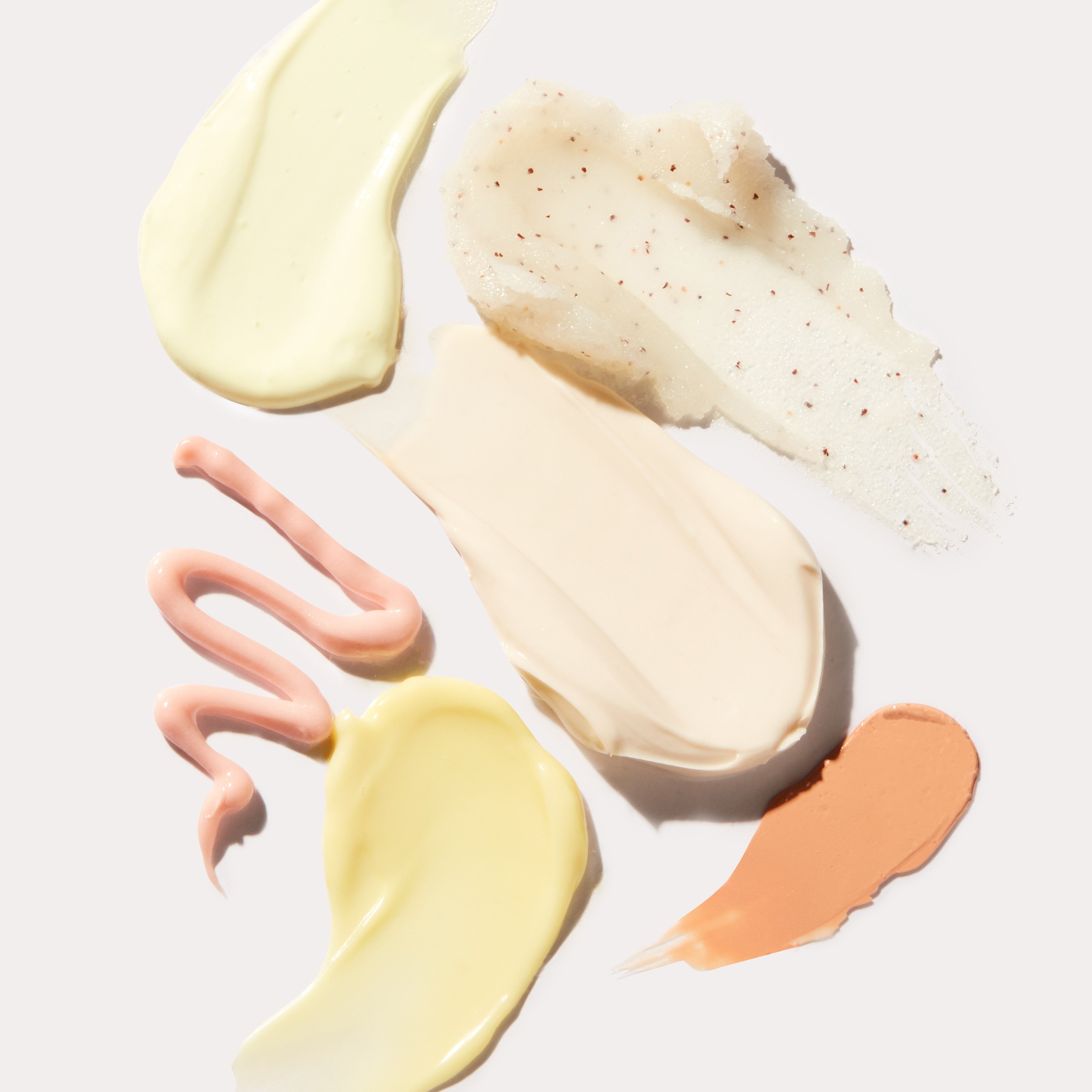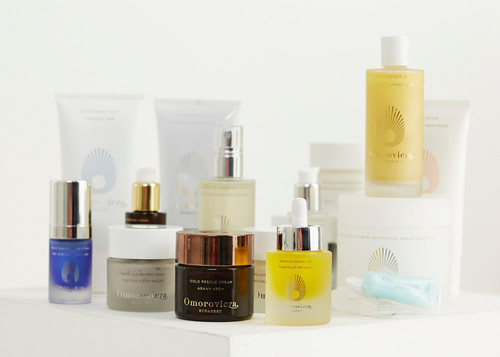Caring for your skin type is much like dressing for your body type—you want to use ingredients and products that are compatible with it—not hurt it—to make the most of your efforts. Skin types vary from person to person, and the routine that works for one skin type and its specific needs may not be the best fit for another. That’s because each different skin type has characteristics to consider. How one skin type responds to the weather, environment, diet, and products can make all the difference between skin that’s just ‘meh’ and skin that’s healthy, glowing and looking its absolute best. So, knowing your skin type is rule number one and caring for its needs appropriately is just as important to make every day a good skin day.
Table of Contents:
- Why Skin Type Matters
- The Different Skin Types
- Identifying Your Skin Type
- Customizing Your Skincare Routine
- Skin Types & Common Concerns
- The Bottom Line
Why Skin Type Matters
Knowing your skin type, learning how to care for it, and making the right skincare choices can help mitigate issues. Taking care of your skin proactively and adequately today can set it up for success in the future. But if you’re not in tune with your skin type and its specific needs, your efforts may be null and void if you’re not feeding your skin with the right ingredients and products and even types of formulations and nourishing it properly.
Every skin type, be it oily, normal, dry, combination, or sensitive, is influenced by certain factors and elements—some more than others—including everything from sun exposure to diet, age, and even underlying health issues. While skincare is not a one-size-fits-all phenomenon, there’s plenty to know and instill if you want to take care of your skin type correctly. For example, age can cause changes to your skin type, so it’s a good idea to keep tabs on any noticeable changes in oil production and hydration levels, which can sometimes be affected by lifestyle choices, such as sun exposure, drinking and poor diet choices, and even the environment. The weather can also impact your skin, and many skin types feel oilier during the summer and drier in the winter, which equates to switching up your products to meet the demands of your skin even if your skin isn’t technically classified as oily or dry.
The Different Skin Types
There are five main skin types, which include:
- dry skin
- oily skin
- combination skin
- normal skin
- sensitive skin
Normal Skin
Normal skin is what it sounds like. The skin is not too oily nor dry (although it can display signs of either at times) and generally is not reactive. Normal skin is easy to care for, indicating well-balanced moisture and little to no signs of redness, acne, dehydration, or enlarged pores.
Although normal skin may be easy to take care of, a well-rounded skincare routine is still essential. Daily use of sunscreen is necessary, as is a gentle, basic moisturizer, routine cleansing and fully removing your makeup at night. Ingredients in your skincare routine should include vitamin C for free radical protection, retinol to keep the skin cell renewal process on track and hyaluronic acid to sustain hydration.
Oily Skin
The telltale sign of oily skin is a shiny, greasy appearance to the face overall. Oily skin produces more than normal amounts of oil due to overactive sebaceous glands. The abundance of oil can instigate clogged, enlarged pores and acne breakouts.
Genetics are the leading cause of oily skin, but hormonal fluctuations and heat can also trigger it.
To control oily skin in an attempt to mattify it, make sure to cleanse it twice daily and always apply a noncomedogenic gel moisturizer or light lotion. Even though the skin is oily, it still needs hydration. Salicylic and glycolic acids are important to keep the pores clean while providing an exfoliation benefit and limiting oil-related breakouts. Since oily skin already feels greasy and heavy, sticking with lightweight and water-based skincare products is better than heavy, rich creams. Blotting papers are mattifying primers that are also helpful in controlling oil.
While you may think that over-cleansing the skin or using drying products is the secret to reducing oil production, it’s not. When the skin is dried out and lacks natural oils, it produces more to compensate for what’s missing.
Dry Skin
Dry skin is known to be itchy, tight, flaky, and sometimes uncomfortable. The reason for dry skin is a lack of water in the outermost layers of the skin, which can arise from genetics, changes in your hormones, poor skincare and eating habits, and even natural aging, leaving the skin thirsty and with a tight feeling. When the skin is dry, it can be sensitive to skincare products and the weather and easily irritated.
Hydration is of the utmost importance for dry skin. Using a humidifier while you sleep to add humidity to the air and applying a thick moisturizer morning and night can help alleviate the symptoms of dry skin. Avoiding dry skin triggers, such as hot showers, are also important.
Combination Skin
When the skin is dry in some areas, like the cheeks, yet oily in others, namely the T-zone, it is considered combination skin. The increase in oiliness and dryness is often related to the climate and weather, which is why combination skin experiences more dryness in the winter and more oiliness in the summer. But using the wrong skincare products can also disrupt combination skin’s balance.
It’s important to cleanse daily with a gentle cleanser that won’t clog the pores or dry out the cheeks to keep combination skin in check. Washing with a cleanser specific to this skin type is a must. You can also use two different cleansers and moisturizers to treat specific parts of the face. For example, use a hydrating cleanser on the cheeks and a clarifying one on the T-zone, and a light gel moisturizer on the T-zone and a thicker one on the cheeks to keep the skin balanced. Combination skin also does well with noncomedogenic, oil-free products like oily skin.
Sensitive Skin
The most reactive and easily irritated skin type is sensitive skin. Not only can sensitive skin easily be instigated by the wrong skincare products, but food choices, sun exposure and environmental factors can also trigger it to react negatively. When sensitive skin doesn’t like something exposed to, it can turn red, become itchy, burn, and display signs of dermatitis in more extreme cases.
To keep sensitive skin calm and under control, use pH-balanced skin care products that are thin and lightweight and store them in a refrigerator for a cooling effect when applied to the skin. You’ll also want to avoid unnecessary additives like parabens, sulfates, fragrances and dyes, and harsh or abrasive ingredients. Alcohol-based products can disrupt the delicate balance of sensitive skin, so steer clear of alcohol-based toners and astringents.
Identifying Your Skin Type
If you’re wondering, “What is my skin type?” it’s pretty easy to figure out. There are two ways to determine the different skin types: the bare-faced test or the blotting sheet test. Both methods are effective in figuring out your skin type.
The bare-faced test is the easier of the two. To determine your skin type using the bare-faced test, cleanse the skin, pat it dry and wait 30 minutes to assess the skin, making sure not to apply any skincare products. Once dry, if the skin feels dry and tight, it is dry. If the skin is dry in some areas and shiny in others, it is combination skin. If your skin is reactive and gets red quickly, it’s likely sensitive. And if your skin is shiny and feels slick, it is oily. Finally, if the skin feels balanced and hydrated, it’s normal. To make the most of the bare-faced test and get the most accurate read, perform it in the morning and again at night.
Another method to determine your skin type is the blotting sheet test which relies on blotting sheets. After washing, take a sheet and press it against different parts of the face, including the chin, nose, forehead, and cheeks. Then, hold the sheet up to the light to get an idea of how much oil is on it. If there’s ample oil on the sheet, your skin is oily. But it is dry if there’s little or no oil on it. If there is some oil on the T-zone, the skin is combination. You can’t assess sensitive skin with the blot sheet test.
Customizing Your Skincare Routine
Using the right skincare products for your skin type is critical for consistently healthy skin. But where should you start when it comes to building a custom skincare routine based on your skincare? No need to worry. We have you covered.
Cleansing
All skin types benefit from regular cleansing, especially at the end of the day.
Oily skin benefits from washing morning and night with a foaming gel cleanser that removes excess oil without stripping the skin. Overwashing the skin can remove too much oil from the skin and cause an uptick in oil production.
For some people with dry skin, skipping the morning cleanse and washing with water helps diminish the feeling of tight skin. Whether you wash dry skin morning and night or just at night, always wash with a hydrating cleanser with ingredients like ceramides and hyaluronic acid to protect the skin’s moisture barrier.
Normal skin can tolerate various skin cleansers, while combination skin should use gentle ones. And sensitive skin should avoid cleansers with heavy fragrances, added dyes and any abrasive ingredients.
Shop Cleansers at SkinStore
Moisturizing
Hydrating the skin is essential to a well-rounded skincare routine, so finding the right one for your skin type is vital.
Oily skin needs hydration to prevent it from overproducing sebum, leaving the skin even oilier. That’s why using one that’s light, noncomedogenic, oil-free, and won’t clog the pores is essential. Gel moisturizers and serums also work well for oily skin. A light to medium-weight cream or lotion for normal skin can provide a light dose of moisture and protect the skin barrier. Sensitive skin should use bland moisturizers without fragrance and apply as necessary, especially if the skin is itchy.
If your skin is combination, using two types of moisturizers may be the best option. You can use an oil-free, lightweight one for the T-zone and a more decadent cream on the cheeks and elsewhere. For dry skin, you’ll want to use a thick and rich cream and apply it regularly to keep the skin soft and hydrated.
Shop Moisturizers at SkinStore
Sun Care
Not a day should go by when the skin isn’t protected from the sun, no matter your skin type. But the correct sunscreen can make all the difference in your skin.
Oil-free sunscreen is ideal for combination and oily skin so as not to instigate breakouts. Conversely, dry skin responds well to hydrating sunscreen formulations for added moisture or chemical sunscreens that don’t settle into fine lines and wrinkles.
Sensitive skin can find sunscreen irritating if the right one is not used. Mineral sunscreens are better suited for sensitive skin since they’re better tolerated and tend to irritate the skin less than chemical sunscreens.
Shop Facial Sun Care at SkinStore
Additional Skin-Specific Treatments to Consider
Skincare extends beyond a daily skin-specific routine. Additional steps or products are necessary for some skin types to retain their vitality and health.
Exfoliating works wonders for most skin types, but overdoing it, especially on dry and sensitive skin, can lead to a compromised skin barrier and long-lasting irritation and dryness. Rather than overdoing it, it’s best to keep your exfoliating efforts to a minimum of once per week and use an exfoliator that won’t strip the skin.
Oily skin types reap the benefits of hydrating serums, sometimes more so than other skin types, especially if traditional moisturizing creams feel too heavy or greasy. That’s because serums that rely on moisturizing ingredients like hyaluronic acid are absorbed into the skin rather than sitting on it, making oily skin feel refreshed rather than like an oil slick. Oil-absorbing masks are also helpful to integrate into your skincare routine, especially if the skin is acting up and oil production is at an all-time high.
When redness ensues on sensitive skin, reach for a skin-calming product to help decrease skin inflammation and irritation. Water-based products with proven skin calmers, like cucumber and calendula, can help to drastically improve the skin.
Sometimes, dry skin needs a major boost in the hydration department so it doesn’t look parched. Sleeping with a humidifier in your room infuses the skin with moisture, but you can also reach for heavier products with emollients and petroleum jelly to seal in moisture so it doesn’t escape while you sleep. Facial oils douse dry skin with nourishing and hydrating natural oils, while moisturizing sheet masks are like a treat for perpetually thirsty skin.
Related Article: The Ultimate Guide to Building a Skincare Routine for Your Skin Type
Skin Types & Common Concerns
Every skin type experiences common concerns beyond the issues that a specific skin type deals with routinely. Here’s how to fix problems like breakouts and aging and get them under control once and for all.
Acne
Acne breakouts aren’t limited just to oily skin types. All skin types can experience pimples occasionally, and what a breakout looks like on one skin type may be completely different from another.
When normal skin breaks out, it can be from stress, hormones or even the weather. You’ll want to apply acne treatments that don’t strip the skin or over-exfoliate it. On the other hand, oily skin experiences more frequent acne breakouts due to increased sebum levels, so retinol and a spot treatment with salicylic acid or benzoyl peroxide and regular exfoliation are essential.
Dry skin can breakouts with acne when it’s too dry. A lack of oil in the skin coupled with irritation can lead to acne, so you should avoid alcohol-based products. Instead, a light spot treatment and a noncomedogenic moisturizer can help alleviate pimples.
When combination skin displays signs of acne, it’s important to treat just the inflamed and acne-prone areas with either retinol or salicylic acid-based skincare product just to those areas. Using these ingredients all over the face can cause increased dryness in areas where dryness persists.
Finally, sensitive skin can break out for all the same reasons as other skin types, but it’s essential to pay attention to the ingredients in anti-acne products since some can irritate the skin and do more harm than good. Avoid harsh toners and exfoliators and only apply spot treatment products to the pimples. Stop using it immediately if something leaves the skin dry, red or itchy.
Shop Skincare for Acne & Blemishes at SkinStore
Aging Concerns
No skin type is immune to aging, and taking a proactive approach with the right anti-aging ingredients and products for your skin type can help it age more gracefully.
Oily skin can be thicker than dry skin, which is inherently thinner. The increase of sebum in oily skin can make fine lines and wrinkles less apparent, but they’re still likely to form. Thin and dry skin can show signs of aging earlier than other skin types.
To maintain skin elasticity in dry and combination skin, enlist collagen-stimulating products like retinol and vitamin C. Using these ingredients regularly can help keep the skin plump and firm. Retinol also works well for mitigating the signs of aging in normal and oily skin, but some with sensitive skin may find it too irritating to handle.
An anti-aging moisturizer is a must for all skin types. Oily and combination skin types should opt for lightweight and noncomedogenic, while dry skin responds well to heavier creams with emollients.
Shop Skincare for Aging Concerns at SkinStore
The Bottom Line
To care for your skin type so that your skincare efforts positively impact your skin, it’s crucial to have a thorough understanding of your skin type. Then, once you have a grip on what type of skin you have and the ingredients and products it best responds to and needs, you can customize a skincare routine specific to your skin type.
Skin can change throughout different parts of our life, so it’s important to constantly check it, especially during hormonal shifts and periods of intense stress. Periodically, you can assess your skin and test your skin type to ensure what you are using on it is still beneficial.
Need more advice? Try our build your own routine based on your skin type to find the perfect products for you!




